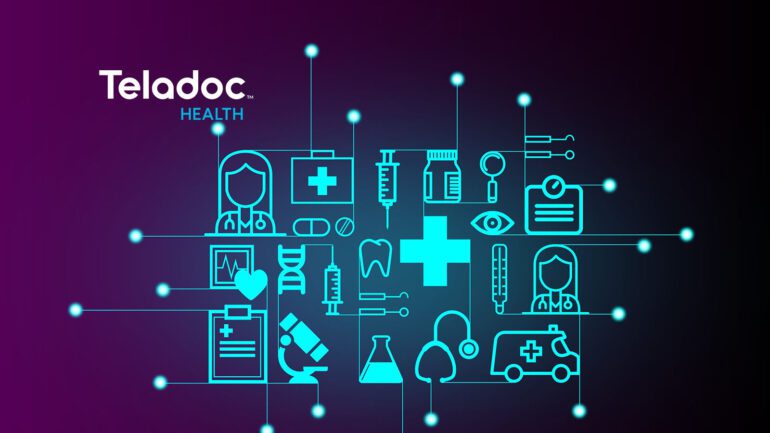TL;DR:
- Teladoc Health and Microsoft are partnering to integrate AI technologies into the Teladoc Health Solo™ platform.
- The integration aims to automate clinical documentation during virtual exams, easing the burden on healthcare professionals.
- The use of AI-powered solutions will improve the quality of medical information sharing and patient care.
- Teladoc Health Medical Group will leverage Nuance DAX Express for care visits.
- The partnership addresses the impending healthcare workforce crisis and supports clinicians in delivering virtual care more efficiently.
Main AI News:
In a groundbreaking move to address the impending healthcare workforce crisis, Teladoc Health, the foremost global leader in whole-person virtual care, is strengthening its collaboration with tech giant Microsoft. Together, they aim to integrate cutting-edge technologies, including Microsoft Azure OpenAI Service, Azure Cognitive Services, and the Nuance Dragon Ambient eXperience™ (DAX™), into the Teladoc Health Solo™ platform.
The crux of this collaboration lies in automating the creation of clinical documentation during virtual exams. By leveraging the power of artificial intelligence (AI), this integration will significantly alleviate the burden on the healthcare workforce, enabling clinicians to focus more on delivering quality care and building meaningful doctor-patient relationships.
Dr. Vidya Raman-Tangella, Chief Medical Officer at Teladoc Health, highlights the significance of this alliance, saying, “We are focused on using AI to reassert and build the doctor-patient relationship at a time when technology frequently does the opposite. We are proud to partner with Microsoft and Nuance to break new ground.”
The statistics paint a concerning picture: By 2025, the U.S. Department of Health and Human Services predicts a nationwide shortage of 90,000 physicians, compounded by professional burnout linked to the demands of electronic paperwork. Physicians currently spend two hours on administrative tasks for every hour of care provided, as reported by the American Medical Association.
Teladoc Health, a long-standing partner to hospitals and health systems, has made it their mission to tackle these challenges head-on. Their commitment to supporting healthcare organizations in alleviating workforce burdens and improving patient care is unwavering. One approach is through hybrid workflows like virtual nursing, where experienced remote nursing staff can take on certain responsibilities that do not require physical touch. This empowers bedside nurses to concentrate on hands-on patient care, ultimately enhancing staff satisfaction.
Tom McGuinness, Corporate Vice President, Global Health & Life Sciences, Microsoft, expressed enthusiasm about continuing their partnership with Teladoc Health. He stated, “Teladoc Health’s integration of Azure OpenAI Service and Nuance DAX gives clinicians the tools they need to deliver quality, coordinated care, easing administrative burdens and allowing them to spend more focused time with their patients.”
Nuance DAX, an ambient clinical documentation solution, integrated into the Teladoc Health Solo platform, automatically records patient encounters with remarkable precision and efficiency. This documentation is then reviewed and signed off by the clinicians. The seamless integration allows clinicians to engage with patients more naturally and conversationally during telehealth visits without the need to divert their attention to type notes.
Additionally, the Teladoc Health Medical Group will leverage Nuance DAX Express, an AI-powered clinical documentation application that combines Nuance’s proven conversational and ambient AI with the latest and most capable AI model, GPT4, in the Azure OpenAI Service. This cutting-edge technology will facilitate quick and accurate reporting of encounters to other virtual and community-based clinicians, thus enabling better coordination of care.
Diana Nole, Executive Vice President and General Manager of Healthcare at Nuance, a Microsoft company, emphasized the significance of this integration, stating, “Adding Nuance DAX and DAX Express into the Teladoc Health ecosystem represents the type of collaborative innovation needed to serve the rapidly changing needs of clinicians and patients across the care continuum.” She further highlighted how this technology addresses the pressing challenge of reducing clinicians’ administrative workloads in the most demanding and dynamic care environments in healthcare.
Teladoc Health and Microsoft’s partnership dates back to 2021 when they collaborated to streamline virtual care provision within Microsoft Teams. This strategic alliance expanded virtual health capabilities for Microsoft Cloud for Healthcare.
Conclusion:
The collaboration between Teladoc Health and Microsoft to integrate AI solutions marks a significant milestone in the healthcare market. By automating clinical documentation and improving virtual care delivery, this partnership addresses the pressing challenges of workforce shortages and administrative burdens faced by healthcare professionals. As AI technology continues to advance, we can expect further innovations in the healthcare sector, enhancing patient experiences and revolutionizing the way medical care is delivered. This partnership sets a precedent for other companies in the market to explore similar collaborations and harness the power of AI to create more efficient and patient-centric healthcare solutions.

